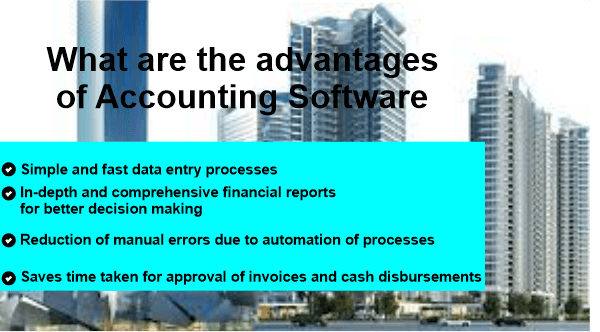Advantages and Disadvantages of Accounting SoftwareWe live in a technologically advanced era where the application of computerized accounting is expanding rapidly. Accounting software, which only some people know, can fundamentally change how an organization manages its accounting. Accounting software is undoubtedly one of the companies' most significant assets, and this is true even though cost savings are not the only factor. Without a doubt, accounting software is made to automate a large portion of the accounting process and make accounting considerably simpler, more accurate, and error-free. However, since relying only on technology may result in some drawbacks, it is crucial to comprehend the foundations of accounting. We hope that by reading this post's conclusion, you will be well informed about the advantages and disadvantages that accounting software provides. One by one, we shall examine the benefits and drawbacks of accounting software. 
Let's start with the benefits of using accounting software in your business. Advantages of Using Accounting SoftwareIt is the digital age, and integrating technology into every aspect has many advantages. Most consumers use accounting software because speed and accuracy are of the utmost importance. There are countless benefits. However, the ones listed below are some of the strongest ones: 1. Simplification As they are made to do automated calculations and give meaning to numbers, accounting software puts financial power in the hands of the user. Entrepreneurs can complete accounting tasks successfully with little training in creative accounting. 2. Accurate Forecasting One of the key advantages of accounting software is accurate forecasting. It is not that easy to comprehend the trends and patterns of your financial performance in depth. Accounting software does offer logic to the statistics, helping users to see where budgetary restraints are necessary. 3. Productivity The accounting systems delve deeply into businesses' most difficult, routine duties, from data collection and management to analysis of some of the most sensitive data. Therefore, accounting software increases a company's productivity. 4. Cost savings This program keeps all kinds of private information in secure areas and under observation. By turning over the revenue framework to an outside specialist, accounting software helps you eliminate the need for outsourced finance management. Additionally, this program lowers the price of printing and sharing documentation. 5. Tax Compliance Many feature-rich accounting programs support payroll and reporting and automatically adhere to tax rules. The program keeps all the essential information for the business to maintain a transparent workflow. 6. Ease of use Although some users might initially find it challenging to use this software, once they become familiar with its interface and capabilities, it becomes rather simple to use and keep track of. 7. Enhances digital proficiency This program improves a person's digital skills in addition to helping corporate operations. You may go from being a technophobe to an internet expert by using the correct accounting software that works in your favour. Disadvantages of using Accounting SoftwareMany organizations use accounting software to automate repetitive accounting operations, set up controls, and generate financial reports. There are usually several accounting software packages available that may satisfy most business requirements, whether from a major corporation or a solo proprietorship. There are several drawbacks to adopting accounting software, even though it can save time and aid in data preservation. 1. Service or Data Loss Any service interruption brought on by a computer or power outage affecting a business that depends on accounting software may disrupt operations. Work interruptions can limit both access to stored information and new information input. Financial data may also be lost in a computer failure if the data is not adequately backed up. 2. Inaccurate Information An accounting system's data is only as reliable as the data that is input into it. Financial results could be erroneous if all input data is checked because most accounting systems involve manual data entry. It could be challenging to identify inaccurate information if a propensity exists to evaluate an accounting system's final reports or output. 3. Configuration of the System Every company has distinctive features that could make it challenging to customize a generic accounting software program to meet its requirements. Many applications allow for customization; however, if done incorrectly, it could result in downtime and errors. Additionally, if a business expands, it can be necessary to switch accounting software programs; this could result in a significant interruption because information must be transferred, and staff members need new training. 4. Cost The expense associated with using accounting software is a drawback. In addition to the software's initial cost, there are costs related to maintenance, modification, training, and computer hardware. Even though time savings make an accounting software investment worthwhile, it may take some organizations years to recover. 5. Fraud Information stored electronically can be accessed, altered, and misused if the proper controls and security measures are not in place. Certain powers must be in place to ensure that only authorized individuals use the accounting software and have access to reports. Accounting software increases the risk of fraud because financial data can be delicate and private. |
 For Videos Join Our Youtube Channel: Join Now
For Videos Join Our Youtube Channel: Join Now
Feedback
- Send your Feedback to [email protected]
Help Others, Please Share









